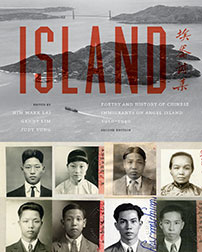 Shortly before the Angel Island Immigration Station in San Francisco Bay was scheduled for demolition in 1970, a California State Park Ranger discovered poems carved in the walls of the former detention center and so began a grassroots movement to preserve the carvings and this vital piece of American history. The first edition of Island was published in 1980 and included translations and transcriptions of most of the station’s carved poems. This new edition–Island: Poetry and History of Chinese Immigrants on Angel Island, 1910-1940, edited by Him Mark Lai, Genny Lim, and Judy Yung, and many years in the making–is a wonderful expansion of an already important work of literature and history. It contains additional poems, greater historical context, and expertly incorporates new research.
Shortly before the Angel Island Immigration Station in San Francisco Bay was scheduled for demolition in 1970, a California State Park Ranger discovered poems carved in the walls of the former detention center and so began a grassroots movement to preserve the carvings and this vital piece of American history. The first edition of Island was published in 1980 and included translations and transcriptions of most of the station’s carved poems. This new edition–Island: Poetry and History of Chinese Immigrants on Angel Island, 1910-1940, edited by Him Mark Lai, Genny Lim, and Judy Yung, and many years in the making–is a wonderful expansion of an already important work of literature and history. It contains additional poems, greater historical context, and expertly incorporates new research.
After passage of the Chinese Exclusion Act of 1882 and its subsequent renewals, Chinese immigrants (and later others as well) had to prove their right to enter the United States. They did so at detention centers and immigration stations like the one opened on Angel Island in 1910 and used for 30 years. While awaiting their immigration hearings, many were detained for days or months while immigration inspectors cross-examined witnesses, examined evidence, and decided their cases. Some of those who were detained carved their thoughts and feelings into the walls themselves, expressing a range of emotions, from hope for the future to sorrow, from camaraderie to despair. The poems are moving and candid.
Island records the entire body of known carvings and inscriptions found at Angel Island. This volume adds poems not included in the first edition, as well as similar poetry found at Ellis Island and an immigration station in British Columbia, Canada (where a similar, though different, kind of immigration restriction was implemented). It also recounts the history of Chinese immigrants and the trials and tribulations faced upon entering the country, using both historical narrative and in-depth oral histories that provide intimate insight into the individual experience.
In shot, Island belongs on the bookshelves of anyone even remotely interested in American history or literature, just as it belongs on the bookshelves of anyone who owns the first edition.
With extensive footnotes to help readers understand references to classical Chinese poems, symbolisms, and idioms, the editors provide a thorough and thoughtful guide. The English translations are placed opposite transcriptions of the Chinese characters.
As the editors Judy Yung and Genny Lim, and the late Him Mark Lai, eloquently put it:
These immigrant poets unconsciously created a new sensibility and a new and emerging Chinese American individuality, which drew on China as the source and America as the bridge to spawn a new cultural identity. Their narratives of self-determination and resistance rank alongside African slave narratives as a legacy for Chinese Americans.
To provide historical context, the new introduction pulls from the valuable new research in Judy Yung and Erika Lee’s book Angel Island: Immigrant Gateway to America (2010) and additional collaborations. Additionally, Judy Yung incorporated twenty oral histories that paint a multi-faceted image of life at the immigration station over the years. Including new oral histories as well as full transcripts of interviews excerpted in the first edition, this section pairs the interviews with images and documents from family members and case files from the National Archives. All are fascinating and compelling reads.
Coming in at about three times the length of the first volume, the second edition of Island provides valuable new content, while preserving the original mission to portray and disseminate the stories, writings, and experiences of Chinese immigrants on Angel Island.
This place is called an island of immortals,
When, in fact, this mountain wilderness is a prison.
Once you see the open net, why throw yourself in?
It is only because of empty pockets I can do nothing else.








